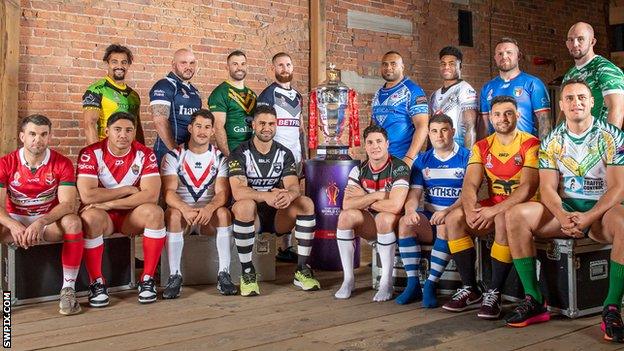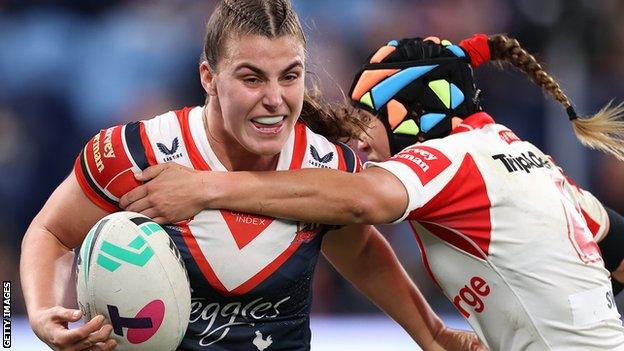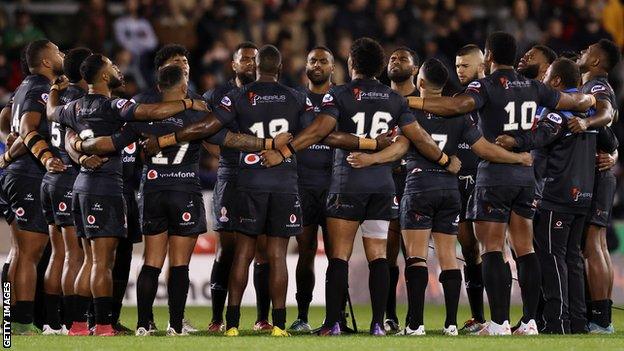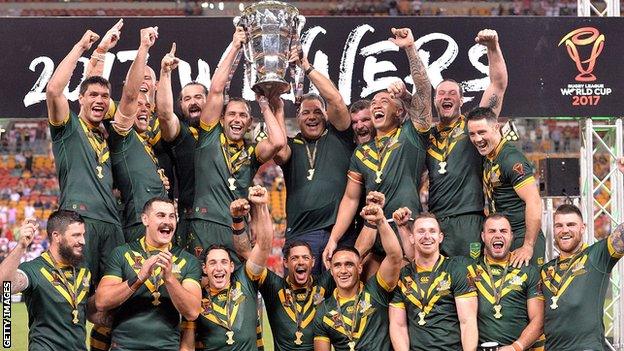Rugby League World Cup: Dave Woods' reasons to follow biggest and most inclusive tournament ever
- Published
- comments

All 16 men's captains were present at Monday's tournament launch in Manchester - but which one will be lifting the World Cup on 19 November?
Rugby League World Cup 2021 |
|---|
Hosts: England Dates: 15 October to 19 November |
Coverage: Watch live on BBC TV, BBC iPlayer and online; Live commentary on Radio 5 Live and Sports Extra; Live texts and highlights on BBC Sport website & app |
This World Cup on English soil promises to be the biggest adventure that international rugby league has ever been on.
Tournaments like this have their key matches to watch out for - home nations fixtures, the clash of giants in the knockout stages, and grand finales at the end of it all.
But it is often the unpredicted moments that live long in the memory as "I was there" events.
And, in the next few weeks, there are going to be plenty of those.
There will be group matches that will be pure rock and roll on a rugby field, there will be spine-tingling cultural displays before and after games, there will be unheralded athletes who will transform into household names, and there will be moments of pure skill or bravery that will make us all go: "Wow!"
So, here are your magnificent seven reasons to tune in or turn up to a tournament that will delight, inspire and fill your imagination over the next five weeks.
1. The most inclusive rugby league event ever
That is no idle boast. With the men's, women's and wheelchair World Cups all coming under one banner, we will get to marvel at three types of rugby league that have so many similarities but so many subtle differences.
Most will have seen a men's running game, while more and more are watching women's rugby league and being thrilled by the skill levels. But it is possibly wheelchair rugby league that will capture the imagination of the uninitiated.
It is brutal, fast and full of artistry. Teams are a combination of players with or without a physical disability, male and female - anyone can play this sport.
Its proponents laugh when the first-time viewer often asks "Is this legal?" as athletes collide with furious intensity. Whatever you do in the next few weeks, watch a wheelchair game.
2. World-class athletes

Jess Sergis will hope to help Australia win a third consecutive World Cup in the women's competition
Rugby league always boasts that its athletes are fitter, stronger and braver than in any other sport, and this will be the chance for it to make its case.
The best players in the world will be on show. In the men's running game, watch out for James Tedesco - the superstar full-back and captain of Australia. England's Dom Young may emerge as a new fan favourite as well.
For the women, Jess Sergis - another Australian - could take top billing. She is the first National Rugby League (NRL) women's player of the year.
In Amy Hardcastle, Emily Rudge and Jodie Cunningham and others, England also have some eye-catching performers.
And the wheelchair tournament could be a platform for England's Jack Brown to become a superstar.
3. Emerging superpowers
International rugby league has been dominated throughout by Australia, with either New Zealand or England/Great Britain challenging them.
In the 2017 World Cup, Tonga emerged as a new superpower as some of the top stars down under chose to play for their country of heritage. They reached the semi-finals and came close to beating England.
Two years later, Tonga beat both Australia and Great Britain, confirming them as the genuine article.
In this World Cup, Samoa should also emerge as possible World Cup winners. They have a raft of top NRL stars in their ranks.
It means there are now five countries with a realistic ambition of lifting the Paul Barriere Trophy, first played for in 1954, at Old Trafford on 19 November.
4. Cultural magic

Fiji were World Cup semi-finalists in 2008, 2013 and 2017
New Zealand's haka is the most famous pre-match cultural performance in the world, and fans will enjoy its fearsome delivery at many venues throughout the World Cup.
Other nations have their own spine-tingling performances to deliver as well. For Samoa, it is the Siva Tau; for Tonga, the Sipi Tau.
But nothing will leave you more moved than listening to Fiji's players singing hymns both before and after each game. When the Fijians embrace their opponents after each match - win or lose - and sing their spiritual anthem, there will not be a dry eye in the house.
5. New nations
Black History Month: Jamaica's Greg Johnson talks tattoos and making rugby league history
This World Cup has gone to places in the qualifiers that it has never been to before and brought some exciting new nations into the fold.
The men's tournament will see Jamaica lining up for the first time on the biggest world stage. They will play only the 25th match in their history when they face Ireland in their opener on Sunday. The match will be played at Headingley, Leeds, and it promises to be a Caribbean takeover on the terraces and in the stands.
Greece have come through incredible adversity to line up in this World Cup. At one stage rugby league was actually banned in that country, and the Greek players had to play matches in secret locations or on neutral territory to qualify. Their reward is a place in Pool A alongside hosts England, France and Samoa.
And Brazil's women will become the first South American team at the World Cup, facing England at the same venue in the first match of that tournament on 1 November.
6. Home nations
In the men's game, England are genuine contenders. But it will be an interesting few weeks for Wales, Scotland and Ireland.
Ireland have a great chance of making the quarter-finals. With a smattering of Super League players and NRL superstar Luke Keary in their ranks, they should qualify in second from a group that includes New Zealand, Lebanon and Jamaica.
But the likelihood is they will face Australia in the first knockout game, and that could be the end of the road.
Scotland are in Group B with Australia, Fiji and Italy. Their opening game against Italy will almost certainly dictate how well they do.
The Welsh have the toughest task. With only one current Super League player in their squad, they are a part-time band of brothers. Their group features Tonga, Papua New Guinea and Cook Islands. Making the knockout phase would be a terrific achievement for them.

Australia beat England to win the most recent men's World Cup on home soil in 2017
7. Unmissable
It will be a truly unmissable World Cup because it is getting the coverage that no other Rugby League World Cup has ever got before. All 61 matches from the three tournaments will be televised on a BBC platform, with 39 of those on network television.
It will reach parts of the nations that the sport has never reached before.
The organisation for this tournament began seven years ago and it has been a long, hard journey to get to the start line.
Now it is up to athletes to perform. I suspect they will not let us down.
Bad habits? Favourite toy? - World Cup skippers reveal all

The champion of two courts ignored by the world: Ora Washington fought to make her name in racially segregated America
How is a jet engine made? Go behind the scenes at the Rolls-Royce factory in Derby to find out

